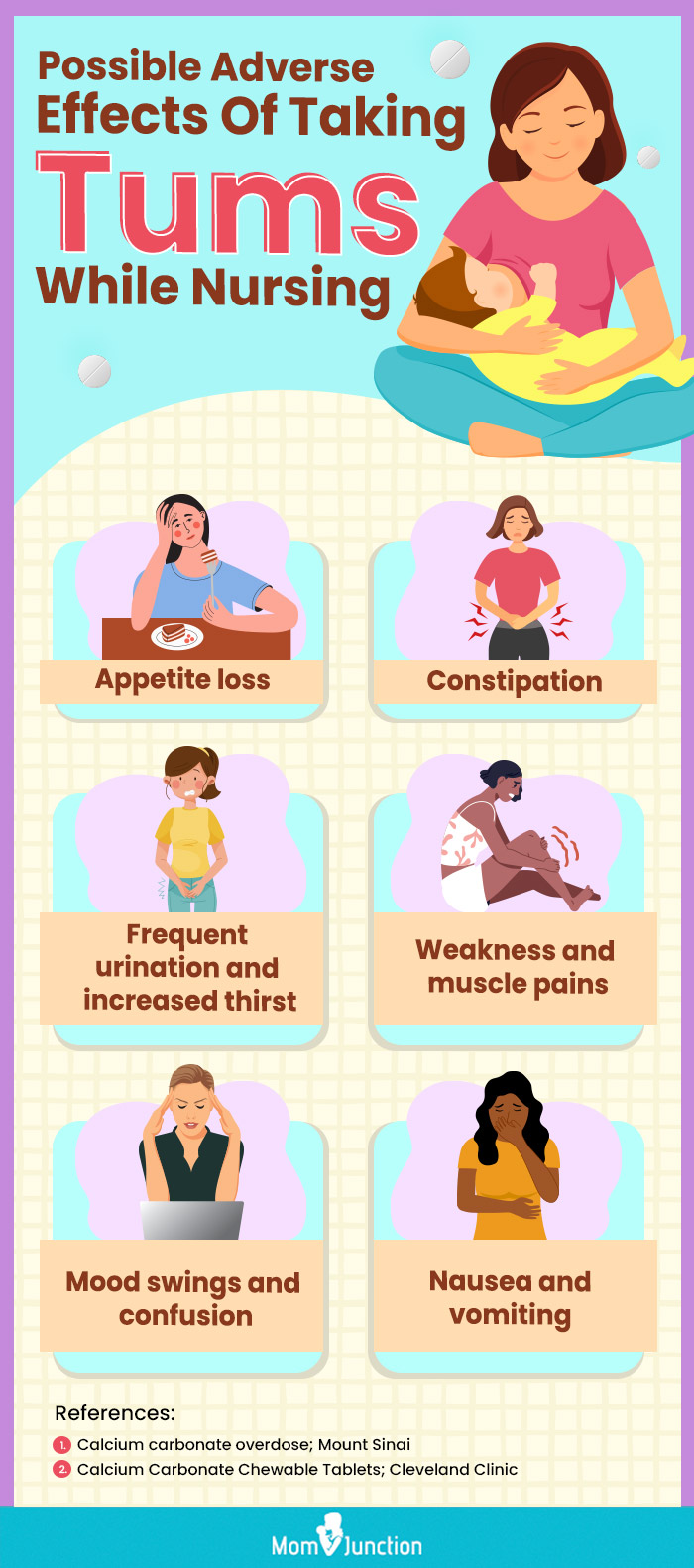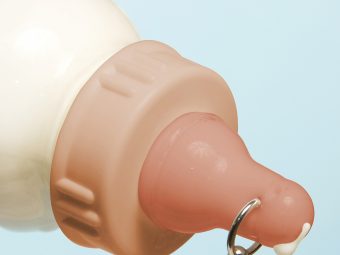
Image: Shutterstock
Acidity and indigestion are common digestive issues women may face during nursing. While dietary changes are helpful, some might consider taking over-the-counter remedies such as Tums. But is Tums safe while breastfeeding?
Certain medicines can pass through breast milk and reach the baby, increasing the risk of side effects. Hence, consulting a doctor is essential before consuming any medicines, even mild antacids. It can help you avoid side effects while also ensuring you take the right dosage.
Read on as we give you an insight into what Tums is, its safety during nursing, possible side effects, and tips to ensure its safe use for lactating mothers.
What Are Tums?
Image: Shutterstock
Tums is a type of antacid made with a combination of sucrose (which is also known as sugar) and calcium carbonate. In the U.S. it is manufactured by GlaxoSmithKline. Tums is available as an OTC, in the form of a sugar-free tablet as well. Tums relieve various issues related to digestion, such as indigestion, acidity, heartburn, sour reflexes and more. Tums is also considered as a calcium supplement.
 Point to consider
Point to considerIs It Safe To Take Tums While You Are Breastfeeding?
Tums contain calcium carbonate, which can easily pass into your breast milk and onto your baby if you are a nursing mother. It also contains simethicone as an ingredient, but there is not enough evidence to show whether or not it passes into your breast milk. To ensure that your baby will not face any side effects from this antacid, consult your doctor first for breastfeeding safety.
Side Effects Of Taking Tums While Breastfeeding
Even though Tums is an over-the-counter medication, it is important to check your doctor for maternal health, especially when you are a breastfeeding mom. Do remember that not everyone will experience the same side effects. Also, the side effects you experience may range from mild to severe, but mentioning them to your doctor is essential. Here are a few side effects that you may experience when you take Tums when breastfeeding:
1. Constipation
You may experience slight or sudden constipation. If you experience any discomfort or do not pass stool for two days at a stretch after you have taken Tums, make sure to stop it and speak to your doctor about it.
2. Loss of appetite
Image: S: iStock
You may also experience a loss of appetite and may not feel hungry enough, as compared to how much you eat while you are breastfeeding.
3. Sudden and unexplained loss in weight
It is also possible that you notice a sudden loss of weight, even if you have not made any changes to your diet. The weight loss that you will experience as a side effect of taking Tums will be sudden and kind of without any apparent reason. Also, if you do experience a loss of appetite as a result of the side effect of taking Tums, it may lead to weight loss.
4. Vomiting or nausea
In some cases, you may experience vomiting once you take Tums. Even if you experience it once or twice, do stop taking the medication and speak to your doctor about it.
Additional Side Effects Of Using Tums
Image: Shutterstock
In addition to the above signs and symptoms, you may also experience the following side effects when you take Tums. Do make sure to speak to your doctor immediately if you experience:
- Pain in the muscles or the bones
- Sudden mood swings such as unexplained depression, over anxiousness, confusion and irritability, without any likely reason
- An increase in your thirst or feeling thirsty all the time, even when you have enough water or fluids
- Frequent urination or an increase in the number of times you urinate, as well as a sudden urge to urinate immediately
- Feeling weak or tired all the time, even if you have rested or slept well
Serious Side Effects Of Using Tums
Image: S: iStock
Here are a few serious side effects of using Tums that are rare, but may still occur. Do visit your nearest medical center immediately if you experience:
- Excessive dizziness
- Swelling on any part of your body (especially if it is in the face, throat or tongue)
- Itching on any part of your body
- The appearance of rashes on any part of your body that may or may not spread or itch
 Point to consider
Point to considerBefore You Take Tums
Image: Shutterstock
While you are breastfeeding your baby, you have to check with your doctor before you take Tums. Also, if you have any health issues that you are currently being treated for, or are aware of, make sure you mention the same to your doctor. Here are a few health conditions about which you should speak to your doctor , when you ask about taking tums while breastfeeding:
- Speak to your doctor if you are aware of any medical allergies that you have experienced in the past. In case you are allergic to calcium carbonate or simethicone, make sure you tell your doctor about the same.
- Sometimes, Tums can contain some inactive ingredients, such as soy, which may not always be mentioned in the ingredient list, or which you may not be aware of. If you know that you have an allergic reaction to soy, make sure to tell your doctor about it.
- If you have suffered from or are currently suffering from very high levels of calcium in your body, a condition that is known as hypercalcemia, make sure you inform your doctor about it.
- If you have suffered from any blockage in the stomach or intestines, do keep your doctor informed.
- If you have ever experienced kidney stones or severe dehydration or are currently experiencing these symptoms, do speak to your doctor about it.
Frequently Asked Questions
1. Can Tums affect the quality or quantity of breast milk?
Tums has not been reported to affect the quality or quantity of breast milk production.
2. Is it necessary to pump and dump after taking Tums while breastfeeding?
No special precautions are required when taking simple antacids containing calcium, magnesium, aluminum salts and simethicone as they are not likely to affect breastmilk (3). Hence it is not necessary to pump and dump after taking Tums while breastfeeding.
3. Can a mother take Tums and continue to breastfeed at the same time?
Calcium is found in breastmilk, and taking calcium carbonate (Tums) to keep its intake within recommended limits (1000mg per day) is unlikely to harm the infant’s health. Therefore, mothers may take Tums occasionally and continue breastfeeding (1). However, self-medication is not advisable.
4. Are there any alternative treatments for heartburn during breastfeeding?
Antacids containing aluminum and magnesium salts and simethicone may work towards heartburn relief. These salts show poor oral absorption, which means that they reach the maternal blood circulation in little amounts (3).
Tums is an over-the-counter antacid that can help with indigestion, acid reflux, heartburn, sour reflexes, and other digestive discomforts. However, whether or not you can take Tums while breastfeeding is unknown. This is because the ingredients might pass into breast milk and cause potential side effects, including sudden loss of weight, loss of appetite, nausea, muscle pain, and sudden mood swings. It may also cause severe side effects, such as dizziness, swelling, or itching. Therefore, make sure to consult your doctor before taking this OTC medicine.
Infographic: Side Effects Of Taking Tums While Breastfeeding
Tums is an over-the-counter medication used to treat heartburn and indigestion; however, it may also pose the risk of specific side effects for nursing mothers, as suggested in this infographic. Therefore, consider taking medical advice while breastfeeding to determine if it is appropriate for you and your infant.

Illustration: Momjunction Design Team
Key Pointers
- Tums, an OTC medicine, should be used by lactating mothers under the guidance of a doctor to treat heartburn and acidity.
- Using Tums during pregnancy may cause constipation, fatigue, frequent urination, appetite and weight loss, nausea, and vomiting.
- Serious side effects of using Tums while breastfeeding include difficulty breathing, dizziness, body swelling, and rashes.
- It is advisable to consult a doctor before taking Tums if a woman has pre-existing conditions such as hypercalcemia, stomach or intestinal blockage, medical allergies, kidney stones, or severe dehydration.
References
- Calcium Carbonate.
https://mothertobaby.org/fact-sheets/calcium-carbonate-pregnancy/pdf/ - Calcium Carbonate Chewable Tablets.
https://my.clevelandclinic.org/health/drugs/20402-calcium-carbonate-chewable-tablets - Antacids.
https://www.ncbi.nlm.nih.gov/books/NBK501322/























